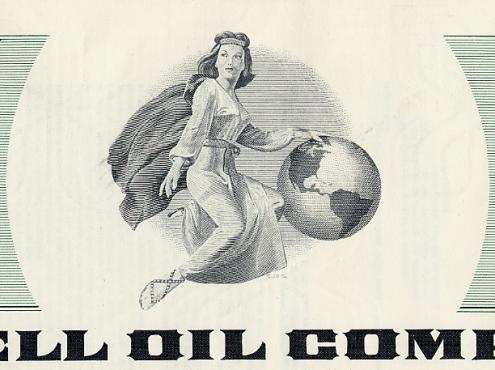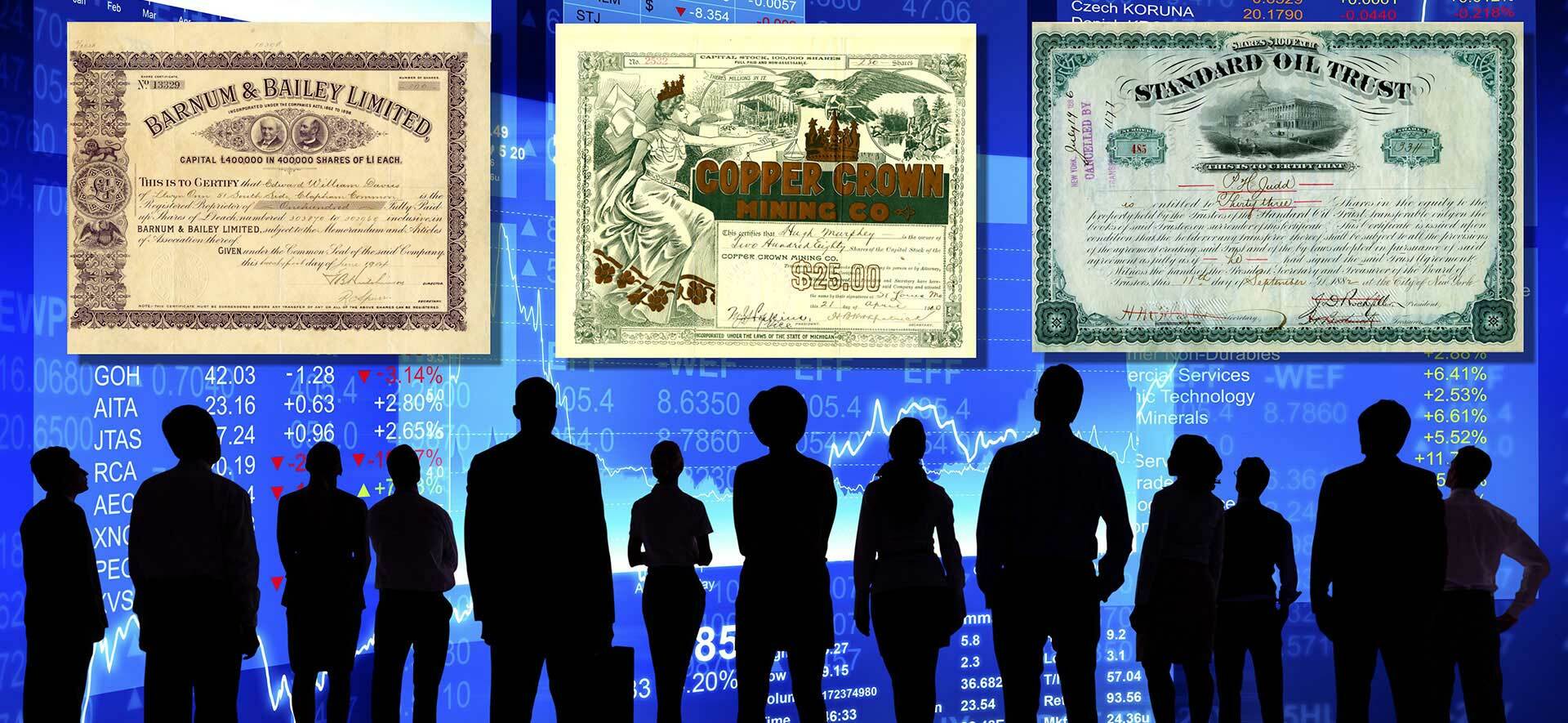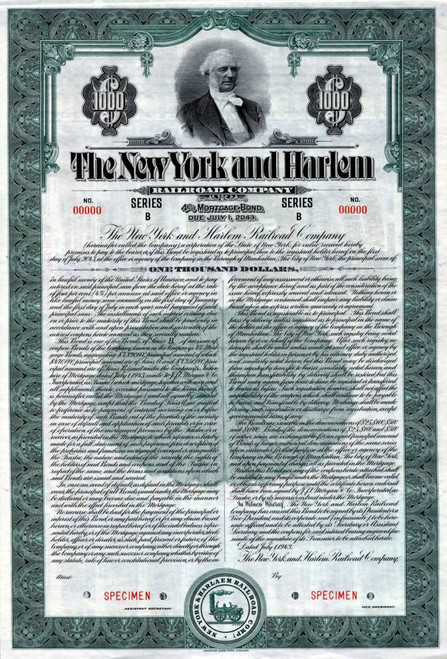Beautifully engraved specimen 14 1/4% certificate from Shell Oil Company dated 1981. This historic document was printed by Jeffries Bank Note Company and has an ornate border around it with a vignette of a woman sitting next to a globe. It also has the section for the dollar amount and serial number in the shape of a shell. This item has the printed signatures of the Company's President and Secretary and is over 25 years old. 
Certificate Vignette In 1833 Marcus Samuel opened a small shop in London, selling sea shells to Victorian natural history enthusiasts. It soon became a thriving import-export business. On a visit to the Caspian Sea coast, Marcus's son recognised a huge opportunity to export oil for lamps and cooking to the Far East. He commissioned the first special oil tanker in 1892, and subsequently delivered 4,000 tonnes of Russian kerosene to Singapore and Bangkok. Meanwhile, the company Royal Dutch had been formed in the Netherlands to develop oil fields in Asia. By 1896 it had its own tanker fleet to compete with the British. In time, it became obvious that the competing Dutch and British companies would do better working together. In 1907, the Royal Dutch/Shell Group of companies was created to incorporate their operations worldwide. Throughout the early twentieth century, the Group expanded with acquisitions in Europe, Africa and the Americas. These were exciting times for the oil industry, as the mass production of cars had opened up a vast new market. The First World War years saw many of Shell's operations closed down or confiscated; but others were added or expanded, particularly in North America. In 1919, Alcock and Brown made the first non-stop flight across the Atlantic - powered by Shell fuel. Shell Aviation Services was established that same year. The 1920s and 1930s were expansion years, with Shell businesses in new regions and new industry sectors; Shell's first foray into chemicals began in 1929. During the Second World War, Shell once again lost businesses, tankers and properties, but supported the Allied Governments with fuel supplies and chemical production. The post-war period Following the Second World War, an enormous effort began to replace and expand Shell's facilities for production, transport and refining to meet the new pressures on demand. Throughout the 1950s and 1960s, Shell's oil output and sales increased dramatically, to the point where Shell supplied almost one-seventh of the world's oil products. This period was also important for the development of natural gas as an alternative source of energy. In the 1970s, Shell made major oil & gas discoveries in the North Sea, just off the coast of Scotland. At the same time, an economic recession combined with a steep rise in the price of crude oil had a serious impact on the oil business. People turned to natural gas. By the end of the decade, gas accounted for about 15% of Europe's energy consumption, with Shell and its partners supplying about half. Liquefied natural gas (LNG) which Shell helped to pioneer also performed well. Meanwhile, Shell was developing its long term interests in coal and metals. In the 1980s, Shell companies installed advanced technology, launched new products and services, and explored solutions to environmental concerns. Shell began to sell unleaded petrol, and subsequently gained a worldwide leadership position. With the 1990s came lower oil prices, and a concentration on Shell's core businesses - mainly oil, gas and chemicals. By mid-decade, Shell had started to look ahead to the new millennium and what would be required of energy companies. This included a specific focus on integrating a commitment to sustainable development throughout the Shell business. Fundamental changes have occurred and continue to be made in the Shell Group to ensure that it retains its competitive advantage. These changes include the unification, in July 2005, of the parent companies of Royal Dutch and Shell Transport under a single parent company, Royal Dutch Shell plc. Shell has been a successful energy company for over 100 years and these latest changes will help to ensure that it carries on being a successful energy company well into the future. Shell Oil Company History from company Press information.
In 1980, President Carter suffered serious setbacks in the area of foreign policy. His negotiators had culminated seven years of strategic arms limitations talks with the Soviet Union when he and the Soviet chairman signed the SALT II treaty. Under the U.S. Constitution, the treaty required ratification by two-thirds of the Senate. Many members of the Senate expressed reservations about the treaty, questioning if it would protect American security interests. When the Soviet Union invaded Afghanistan in early 1980, President Carter asked the Senate not to consider the treaty further. Militants in Iran seized the U.S. Embassy in Tehran in November 1979 and took some 60 Americans as hostages. Unable to persuade Iran to release them, President Carter ordered a military rescue mission, which failed, resulting in the deaths of eight American servicemen when their aircraft collided in the Iranian desert. Carter's failure to secure the hostages' freedom, after a year's captivity, was considered by political scientists a factor in his defeat in the 1980 presidential elections. President Carter also grappled with serious domestic problems, primarily the economy and energy. Rising oil and food prices, a slowdown in the economy, and double digit inflation which approached 14 percent in 1979 and climbed over 20 percent in 1980, plagued all Americans. It was the worst inflation rate in recent decades. Compounding his domestic difficulties was a high unemployment rate: in 1979 it fluctuated between 5.6 and 6.0 percent of the civilian work force, but in some cities the rate was much higher. In Detroit, for example, the auto industry because of low car sales, ordered widespread layoffs and the city's unemployment rate soared to 18 percent.
About Specimens Specimen Certificates are actual certificates that have never been issued. They were usually kept by the printers in their permanent archives as their only example of a particular certificate. Sometimes you will see a hand stamp on the certificate that says "Do not remove from file". Specimens were also used to show prospective clients different types of certificate designs that were available. Specimen certificates are usually much scarcer than issued certificates. In fact, many times they are the only way to get a certificate for a particular company because the issued certificates were redeemed and destroyed. In a few instances, Specimen certificates we made for a company but were never used because a different design was chosen by the company. These certificates are normally stamped "Specimen" or they have small holes spelling the word specimen. Most of the time they don't have a serial number, or they have a serial number of 00000. This is an exciting sector of the hobby that grown in popularity over the past several years.

Certificate Vignette
In 1980, President Carter suffered serious setbacks in the area of foreign policy. His negotiators had culminated seven years of strategic arms limitations talks with the Soviet Union when he and the Soviet chairman signed the SALT II treaty. Under the U.S. Constitution, the treaty required ratification by two-thirds of the Senate. Many members of the Senate expressed reservations about the treaty, questioning if it would protect American security interests. When the Soviet Union invaded Afghanistan in early 1980, President Carter asked the Senate not to consider the treaty further. Militants in Iran seized the U.S. Embassy in Tehran in November 1979 and took some 60 Americans as hostages. Unable to persuade Iran to release them, President Carter ordered a military rescue mission, which failed, resulting in the deaths of eight American servicemen when their aircraft collided in the Iranian desert. Carter's failure to secure the hostages' freedom, after a year's captivity, was considered by political scientists a factor in his defeat in the 1980 presidential elections. President Carter also grappled with serious domestic problems, primarily the economy and energy. Rising oil and food prices, a slowdown in the economy, and double digit inflation which approached 14 percent in 1979 and climbed over 20 percent in 1980, plagued all Americans. It was the worst inflation rate in recent decades. Compounding his domestic difficulties was a high unemployment rate: in 1979 it fluctuated between 5.6 and 6.0 percent of the civilian work force, but in some cities the rate was much higher. In Detroit, for example, the auto industry because of low car sales, ordered widespread layoffs and the city's unemployment rate soared to 18 percent.
About Specimens Specimen Certificates are actual certificates that have never been issued. They were usually kept by the printers in their permanent archives as their only example of a particular certificate. Sometimes you will see a hand stamp on the certificate that says "Do not remove from file". Specimens were also used to show prospective clients different types of certificate designs that were available. Specimen certificates are usually much scarcer than issued certificates. In fact, many times they are the only way to get a certificate for a particular company because the issued certificates were redeemed and destroyed. In a few instances, Specimen certificates we made for a company but were never used because a different design was chosen by the company. These certificates are normally stamped "Specimen" or they have small holes spelling the word specimen. Most of the time they don't have a serial number, or they have a serial number of 00000. This is an exciting sector of the hobby that grown in popularity over the past several years.














